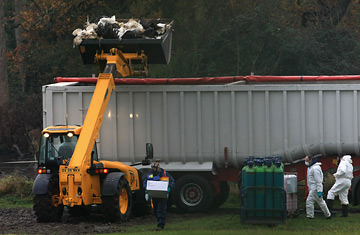
Carcasses from the ongoing cull of around 2,600 birds, including ducks and geese, are loaded into a container lorry for disposal, near Diss, Norfolk, England.
The virulent H5N1 strain of avian influenza has been confirmed as the source of a bird flu outbreak on an English farm.
Thousands of birds are being slaughtered on a turkey farm in Suffolk, around 100 miles northeast of London, as officials work to contain the outbreak.
The farm, Redgrave Park, is a free-range facility situated near a wetlands that is a refuge for geese, ducks and other wild birds. These birds, along with some 3 million poultry on farms within 10 km of the outbreak, are currently under surveillance by vets from the Department for Environment, Food and Rural Affairs (Defra), Britain's farm agency.
"This will not be a quick exercise," Britain's Acting Chief Veterinary Officer Fred Landeg said. "This is a particularly challenging site and our priority is to adhere to strict bio-security, and the health and safety of staff on site is paramount".
Defra said initial sequencing of the strain of the virus on the Regrave Park Farm shows a close relationship to a strain that caused an outbreak in Bavaria, Germany, in August. This suggests that the virus was carried across the North Sea by migratory birds, although Defra said it is also investigating the possibility that it was brought over by humans, perhaps in infected turkey feed.
While H5N1 is difficult for humans to catch, experts fear it could mutate into a form that spreads easily among people, sparking a deadly flu pandemic. Microbiologist Hugh Pennington of the University of Aberdeen said the latest outbreak is part of a "steady creep westward" by the strain from its original hothouse of Southeast Asia.
"It has been lurking in Western Europe for sometime now. In a way, it's encouraging, as the more time that passes without it mutating suggests it might not be able to mutate into a form that could cause a pandemic. But influenza is so unpredictable it's impossible to say for sure what will happen with this strain," he said.
This is the second outbreak of H5N1 in poultry in England. The first, in February, led to the culling of nearly 160,000 factory-farmed birds. Farmers have raised concerns about the impact on the lucrative Christmas turkey trade, during which time poultry breeders would expect to sell more than 20 million birds, according to a report in The Guardian newspaper. British farms are already struggling to recover from a year of animal pestilence, as livestock have been besieged by foot-and-mouth and bluetongue disease, two other gruesome and costly viruses. The downturn following the last bird flu outbreak cost the British poultry industry an estimated $19 million in 12 weeks. Humans may currently be safe from bird flu and Britain's other animal viruses, but for Britain's farming industry there are fears that they could be deadly.
